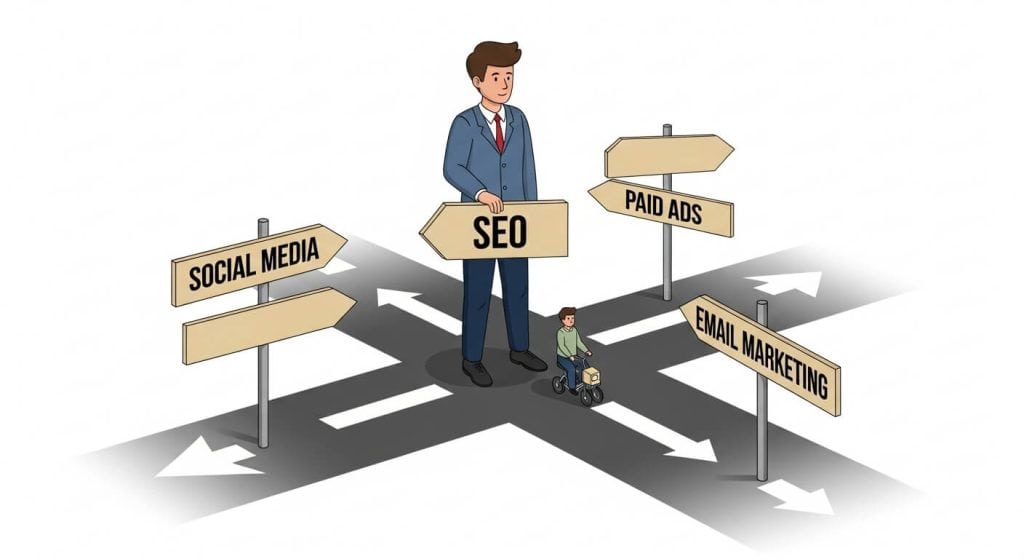How to Become a Digital Marketer Without a Degree or Experience
Digital marketing is one of the few industries where your portfolio matters more than your diploma. You don’t need a degree. You don’t need agency experience. What you need is proof you can help a business grow online — and that proof is entirely within your reach.
If you’re wondering: Can I start digital marketing with no experience? How long does it take to learn digital marketing? How long to become a digital marketer? Can I get hired without a degree? How do I start digital marketing in a structured way? This guide walks you through the answers — clearly, practically, and in depth.
Understand What Digital Marketing Really Is

Digital marketing isn’t about posting pretty content. It’s about helping brands attract the right people, build trust, and convert attention into action.
It includes multiple disciplines, such as: search engine optimization (SEO), content marketing, paid advertising, email marketing, social media marketing, and analytics. Each of these is its own career path. You don’t need to learn all of them at once. In fact, you shouldn’t.
Choose One Focus (Then Go Deep)

One of the fastest ways to fail is trying to learn everything at the same time. Choose a single starting point and commit to it for at least 1–2 months.
If you like writing and research, start with SEO or content marketing. If you enjoy design and trends, explore social media. If you prefer data and performance, try paid ads. If you like automation and structure, go into email marketing. Starting deep instead of wide gives you clarity, results, and faster progress.
Learn Through Doing, Not Just Studying

There’s no shortage of free content. The problem is most beginners spend too much time consuming and not enough time applying.
Start with one structured course: Google Digital Garage, HubSpot Academy, or targeted YouTube tutorials. Study consistently — but always pair learning with action. If you study SEO, publish a blog. If you learn Instagram strategy, post content. Execution is where real understanding begins.
Create Your First Project (Even Without a Client)
You don’t need a client to gain experience — but you do need a project. Start a blog, grow a niche Instagram page, build a landing page, or run a $10 ad campaign. Offer to help a friend’s business or local brand for free.
Treat it like a real campaign. Set goals. Measure results. Iterate. This is how you build skills and credibility — even before you get paid.
Learn the Right Tools for Your Specialization

Different areas of digital marketing use different tools. You don’t need to learn everything. Focus only on what supports your skill path.
Learn the Right Tools for Your Specialization
Different areas of digital marketing use different tools. You don’t need to know everything. Focus only on what supports your skill path.
If you’re learning SEO:
- Google Search Console
- Ubersuggest or Ahrefs (free versions)
- WordPress (or another CMS)
- SurferSEO or Yoast
If you’re learning paid ads:
- Meta Ads Manager (Facebook, Instagram)
- Google Ads
- Google Analytics
- Campaign tracking in spreadsheets
If you’re learning social media:
- Canva
- Meta Business Suite
- Instagram Insights or TikTok Analytics
- Scheduling tools like Later or Buffer
If you’re learning email marketing:
- Basic automation and segmentation logic
- Mailchimp or Brevo
- Google Forms + Zapier (for testing flows)
Don’t just watch tutorials. Use the tools. Create something. Learning through use always beats theory.
Build a Simple, Focused Portfolio
You don’t need a fancy website. You need proof. One or two clear case studies from your personal project are enough. What was the goal? What did you do? What happened? That’s all employers or clients need to see.
How Long Does It Take to Learn Digital Marketing?
With consistent effort, you can go from zero to job-ready in 6–12 months. Learn core concepts in 1–2 months. Run your own project within 2–3 months. Build confidence and a portfolio in 4–6 months. Get freelance work or entry-level roles within 6–12 months.
Some people do it faster. Others take longer. The pace depends on how quickly you start doing, not just learning.
How to Get Real Work (Even With No Experience)
Once you’ve done the work, you can show the work. Start by reaching out to local businesses. Apply for junior roles or internships. Try freelance platforms like Upwork or Contra. Share your learning journey on LinkedIn or X. Keep your offer focused. You’re not expected to be perfect — just capable, clear, and eager to grow.